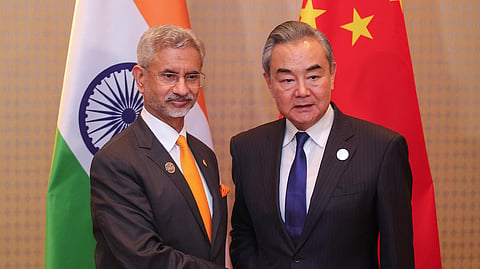'Notable developments' in India-China relations, says Jaishankar during meeting with Wang at G20
NEW DELHI: There have been “notable developments” in the India-China relationship since November 2024, including the management of peace and tranquility in the border areas, as well as other aspects of the relationship, External Affairs Minister Jaishankar said during his meeting with Chinese counterpart Wang Yi, as both the neighbours work to normalise their ties.
The two ministers met on the sidelines of the G20 Foreign Ministers’ meeting in Johannesburg, South Africa, on Friday.
“Since our last meeting in Rio during the G20 Summit in November 2024, there have been some notable developments. Our NSA and Foreign Secretary have visited China and there have been discussions about various aspects of our relationship,” Jaishankar said.
Ministry of External Affairs Spokesperson Randhir Jaiswal, referring to the 30-minute discussion between the two leaders, said they reviewed several issues, including the management of peace and tranquility along the border, the Kailash Mansarovar Yatra, cross-border rivers, and trade facilitation.
In December last year, national security adviser Ajit Doval and Wang Yi, the two special representatives (SR) for boundary talks, met and agreed to “inject vitality” into the process of resolving the long-standing boundary dispute between the two countries, and committed to maintain “peace and tranquility” in the border areas to strengthen bilateral relations.
The resumption of SR-level talks was agreed upon during the meeting between Prime Minister Narendra Modi and Chinese President Xi Jinping on the sidelines of the 16th BRICS summit in Kazan, Russia, in October last year.
Jaishankar also met with Russian Foreign Minister Sergey Lavrov and discussed the ongoing progress of bilateral cooperation between India and Russia.
During the meeting, the two leaders addressed the Ukraine conflict and the recent Russia-USA meeting in Riyadh.
Sharing a post on X, Jaishankar wrote: "Glad to meet FM Sergey Lavrov of Russia this evening in Johannesburg. Reviewed the continued progress of India-Russia bilateral cooperation. Discussed recent developments related to the Ukraine conflict, including his Riyadh meeting.”
Taking part in the geopolitical discussion at the G 20 meet, Jaishankar said the global geopolitical situation remains challenging, shaped by the lasting effects of the COVID pandemic, conflicts, financial pressures, food security, and climate concerns.
“Some of it is the accumulated challenges of the Covid pandemic, conflict situations, financial pressures, food security and climate concerns. But there is also the current anxieties about concentrated supply chains, weaponization of trade and finance, and transparency of data flows. Looking ahead, differential progress on AI and EV, space, drones or green hydrogen have clear geo-political implications,” he said.

